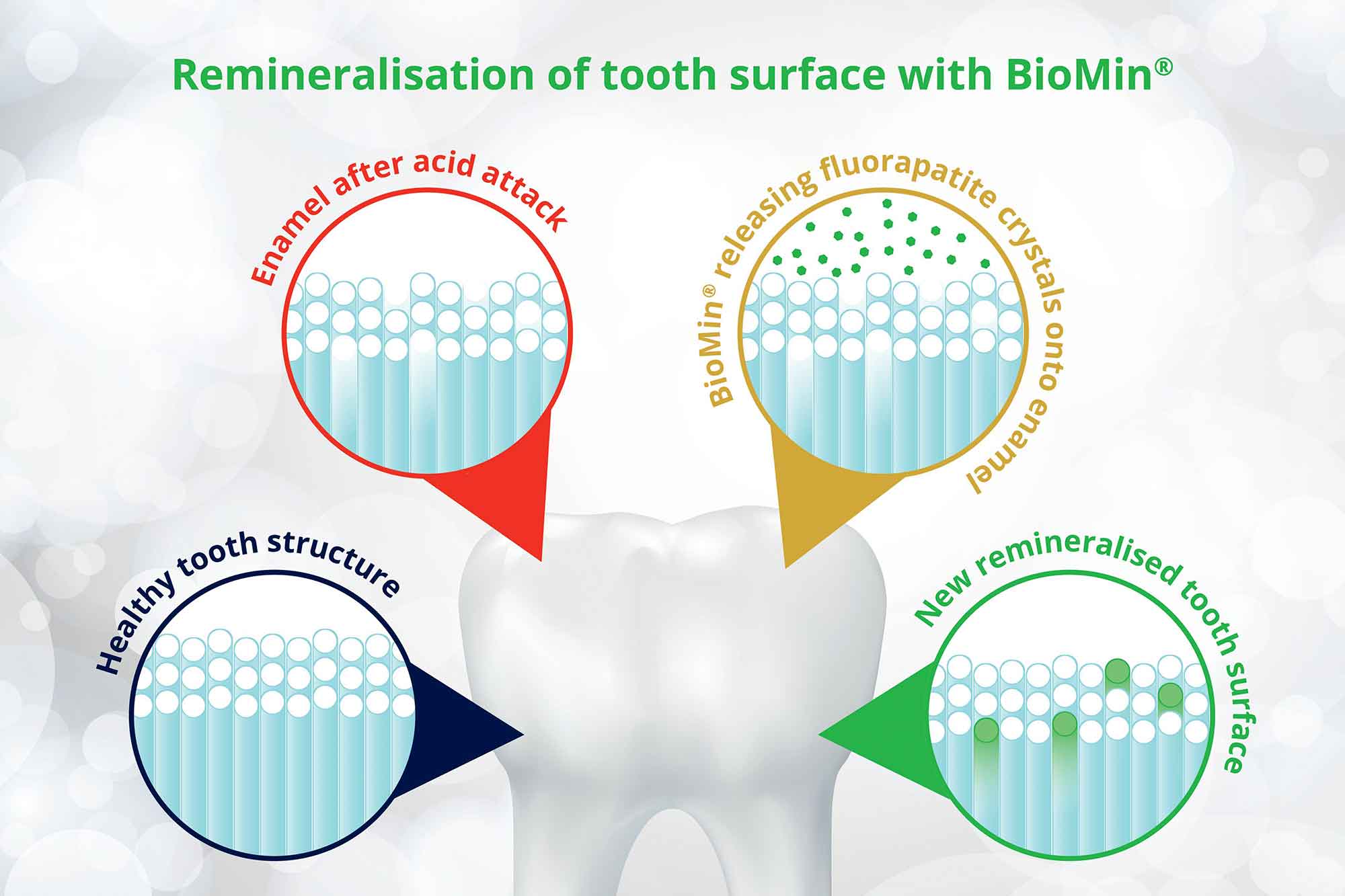 Biomin F remineralises dental enamel more effectively than standard fluoride toothpaste, a new study shows.
Biomin F remineralises dental enamel more effectively than standard fluoride toothpaste, a new study shows.
The study, in Tomography journal, compared Biomin F with standard Colgate fluoride toothpaste (1,450ppm).
Researchers compared the effects of the two toothpastes on demineralised tooth surfaces across three indicators: surface micro-hardness, surface roughness and volume gain. Biomin F outperformed the fluoride toothpaste on all counts. These are key factors to help limit the risk of dental caries.
Demineralisation is the precursor to dental caries, one of the commonest diseases worldwide. It is the second most common cause of tooth loss after periodontal disease.
It is a problem that dental public health stakeholders have grappled with for many years. Consumption of sweet and acidic foods, and sweet or fizzy drinks, has been a significant factor in the caries epidemic. But the introduction of water fluoridation in some areas and fluoride in toothpaste has played a major part in reducing the problem.
However, the launch of Biomin F has moved the goalposts.
Why is Biomin F different?
Biomin F is a novel toothpaste based on a patented bioactive technology. It incorporates not only fluoride, but also calcium and phosphate within the structure of the toothpaste.
Biomin F adheres to the tooth surface where it gradually dissolves over up to 12 hours. It releases these ions into the mouth where they work with saliva to form fluorapatite. This crystalises on the tooth surface, effectively remineralising and repairing the enamel surface.
Demineralisation results in softening of the enamel surface and is the initial stage of the caries process.
Effective remineralisation reverses this by increasing the surface hardness. It is therefore an essential step in halting the development of carious lesions.
As demineralisation occurs, the tooth surface also gets rougher, and Biomin F was shown to reduce that roughness by filling in the troughs or valleys formed by demineralisation helping to reduce plaque accumulation in these dips.
Finally, the increase in volume is due to the quantity of fluorapatite that is deposited to replenish the tooth structure. This provides added protection.
‘The slow release of calcium and phosphate as well as fluoride in Biomin F enhances the rate of remineralisation compared to a standard fluoride toothpaste,’ explained Richard Whatley, CEO of Biomin Technologies Ltd.
‘Remineralisation is central to the principles of preventive dentistry. Biomin F is shown here to be more effective at replacing lost mineral caused by acidic attack.’
Calls for further trials
Standard fluoride toothpaste scavenges calcium and phosphate from saliva. But with Biomin, these are delivered together in the correct ratio to form stable, more acid-resistant fluorapatite.
‘We provide the right levels of calcium, phosphate and fluoride to optimise the development of fluorapatite,’ he continued.
The continuous release of these ions at low concentration over several hours, rather than a high immediate ‘hit’ also enhances the remineralisation process.
The study’s authors commented: ‘[Biomin F] toothpaste contains a lower concentration of fluoride compared with the fluoride toothpaste used in our study.
‘This low concentration not only helps in the prevention of undesirable fluorite formation but also ensures the long-term delivery of fluoride ions for the formation of a stable fluorapatite layer.’
As these measurements are only possible on extracted teeth, the researchers called for in vivo trials.
Now that Covid restrictions are easing, a new clinical trial is now underway at Queen Mary University of London. It will look at the effectiveness of Biomin F to remineralise white spot lesions.
Effective remineralisation
This study echoes the findings of another paper published this year which compares the remineralisation potential of Biomin F and another competitor.
After brushing for two weeks, the mineral content of the demineralised enamel increased with both the competitor and Biomin. But because the phosphate concentration is higher: ‘Biomin may be more effective in the remineralisation of demineralised enamel,’ commented the researchers.
‘The use of bioactive glass toothpastes as remineralising agents are promising in repairing early carious lesions.’
Demineralisation is the foundation of caries. A toothpaste that acts effectively to replenish tooth mineral could play a huge part in combating the disease.
What’s more, in the presence of acid in the mouth, for example after consuming a fizzy drink, Biomin F’s smart technology enables it to start working quickly to reverse the early stages of demineralisation and to help neutralise acidity.
‘In order to manage the caries process, you need to remineralise the tooth surfaces as effectively as possible,’ concluded Biomin CEO Richard Whatley.
For more information on Biomin visit biomin.co.uk.

